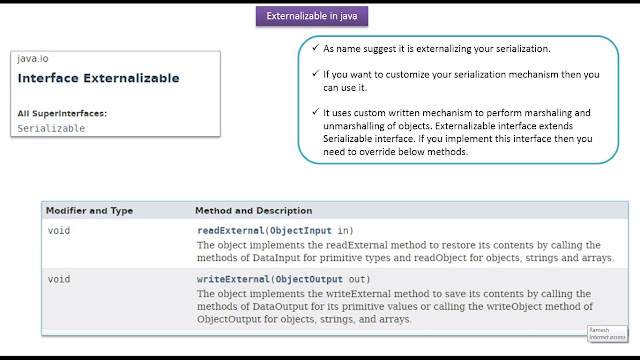Click here to watch in Youtube :
Click the below Image to Enlarge
 |
| Java Tutorial : Java IO (Java Externalizable | Java externalization | Custom Serialization) |
 |
| Java Tutorial : Java IO (Java Externalizable | Java externalization | Custom Serialization) |
 |
| Java Tutorial : Java IO (Java Externalizable | Java externalization | Custom Serialization) |
import java.io.Externalizable;
import java.io.IOException;
import java.io.ObjectInput;
import java.io.ObjectOutput;
public class Employee implements Externalizable
{
private int id;
private String name;
private int age;
public Employee()
{
}
public int getId()
{
return id;
}
public void setId(int id)
{
this.id = id;
}
public String getName()
{
return name;
}
public void setName(String name)
{
this.name = name;
}
public int getAge()
{
return age;
}
public void setAge(int age)
{
this.age = age;
}
@Override
public String toString()
{
return "Employee [id=" + id + ", name=" + name +
", age=" + age + "]";
}
@Override
public void readExternal(ObjectInput in) throws IOException,
ClassNotFoundException
{
System.out.println("Inside readExternal");
id = in.readInt();
name = (String) in.readObject();
}
@Override
public void writeExternal(ObjectOutput out) throws IOException
{
System.out.println("Inside writeExternal");
out.writeInt(id);
out.writeObject(name);
}
}
import java.io.FileNotFoundException;
import java.io.FileOutputStream;
import java.io.IOException;
import java.io.ObjectOutputStream;
public class ExternalizableWrite
{
public static void main(String[] args) throws FileNotFoundException,
IOException, ClassNotFoundException
{
ExternalizableWrite externalizableWrite = new ExternalizableWrite();
externalizableWrite.writeEmployeeObject();
}
private void writeEmployeeObject() throws FileNotFoundException,
IOException
{
FileOutputStream fileOutputStream = null;
ObjectOutputStream objectOutputStream = null;
//Serialize
try
{
fileOutputStream = new FileOutputStream("employee.ser");
objectOutputStream = new ObjectOutputStream(fileOutputStream);
Employee employee = new Employee();
employee.setId(101);
employee.setName("Peter");
employee.setAge(25);
System.out.println(employee);
/*
* Write the specified object to the
* ObjectOutputStream.
*/
objectOutputStream.writeObject(employee);
System.out
.println("Successfully written employee object to the file.\n");
}
finally
{
if (objectOutputStream != null)
{
/*
* Closing a ObjectOutputStream will also
* close the OutputStream instance to which
* the ObjectOutputStream is writing.
*/
objectOutputStream.close();
}
}
}
}
Output
Employee [id=101, name=Peter, age=25]
Inside writeExternal
Successfully written employee object to the file.
ExternalizableRead.java
import java.io.FileInputStream;
import java.io.FileNotFoundException;
import java.io.IOException;
import java.io.ObjectInputStream;
public class ExternalizableRead
{
public static void main(String[] args) throws FileNotFoundException,
IOException, ClassNotFoundException
{
ExternalizableRead externalizableRead = new ExternalizableRead();
externalizableRead.readEmployeeObject();
}
private void readEmployeeObject() throws IOException,
FileNotFoundException, ClassNotFoundException
{
FileInputStream fileInputStream = null;
ObjectInputStream objectInputStream = null;
//Deserialize
try
{
fileInputStream = new FileInputStream("employee.ser");
objectInputStream = new ObjectInputStream(fileInputStream);
/*
* Read an object from the ObjectInputStream.
*/
Employee employee = (Employee) objectInputStream.readObject();
System.out.println(employee);
System.out
.println("Successfully read employee object from the file.\n");
System.out.println("Id = " + employee.getId());
System.out.println("Name = " + employee.getName());
System.out.println("Age = " + employee.getAge());
}
finally
{
if (objectInputStream != null)
{
/*
* Closing a ObjectInputStream will also
* close the InputStream instance from which
* the ObjectInputStream is reading.
*/
objectInputStream.close();
}
}
}
}
Inside readExternal
Employee [id=101, name=Peter, age=0]
Successfully read employee object from the file.
Id = 101
Name = Peter
Age = 0


No comments:
Post a Comment